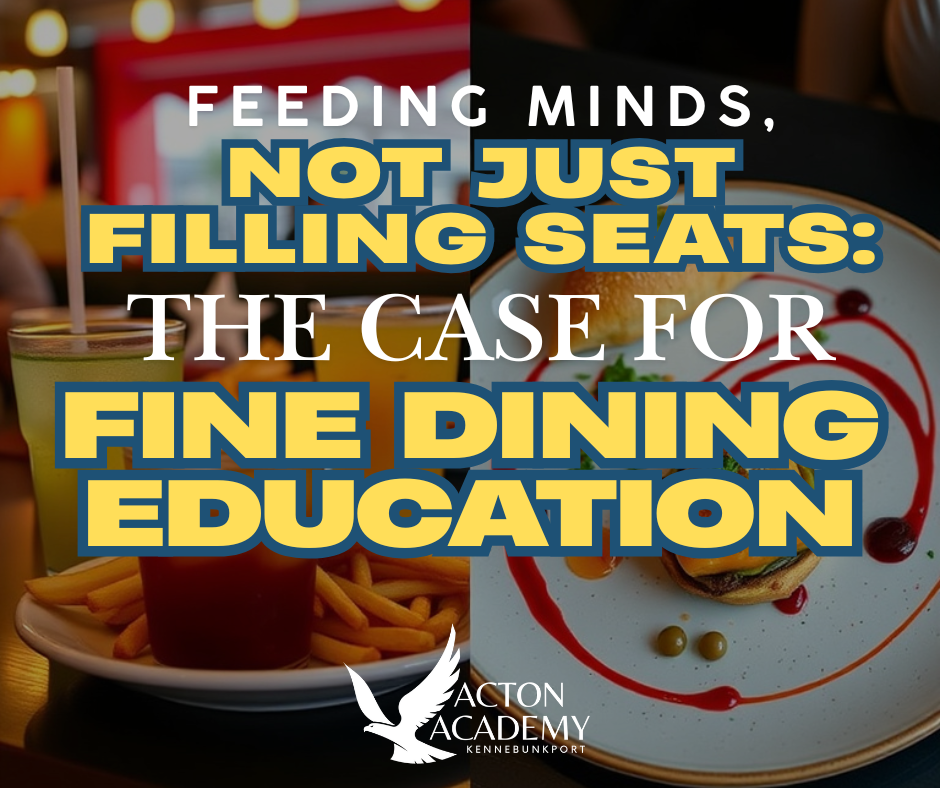Imagine walking into a restaurant.
On one side of the street, there’s a neon-lit fast food chain. The menu is identical in every city, every country. The meals are quick, cheap, and convenient—but let’s be honest: they’re also bland, uniform, and not exactly nourishing.
Across the street sits a cozy, Michelin-starred bistro. Here, chefs tailor the menu to local ingredients and seasonal flavors. Every dish is crafted with care. No two plates are quite alike. The meal takes longer, but the experience is unforgettable—and deeply satisfying.
So here’s the question: Which one resembles your child’s education?
The Fast Food Model of Schooling
Sir Ken Robinson, the late educationalist and creativity champion, once argued that our schools have become like fast food restaurants.
“They’re built on conformity and standardization,” he said. “Everything is the same, everywhere. It’s convenient and predictable, but it starves the spirit.”
Sound familiar?
Think about it:
-
One-size-fits-all curricula.
-
High-stakes tests that define success.
-
Teaching styles designed to “cover content,” rather than spark curiosity.
In the fast-food model, education churns out students like identical burgers on an assembly line. But there’s a cost: creativity, engagement, and passion often end up on the chopping block.
Fine Dining: A Better Recipe for Learning
Sir Ken suggested we need an agricultural model of education rather than an industrial one. Education, he believed, should be organic—like fine dining.
Instead of mass-producing identical meals, fine dining chefs:
-
Work with diverse ingredients.
-
Adjust recipes to suit individual tastes.
-
Present food as an art form, not a commodity.
In the same way, great schools:
-
Discover each student’s unique strengths.
-
Foster creativity and critical thinking.
-
Create learning experiences that nourish both mind and spirit.
Imagine a classroom where:
-
One student writes a song to explain geometry.
-
Another builds a model to demonstrate how photosynthesis works.
-
A third crafts a story that weaves together science and art.
That’s fine dining education.
Standardization vs. Customization
Fast food isn’t all bad. It’s fast, reliable, and cheap. But when it comes to education, “cheap and fast” shouldn’t be the goal.
Children are not identical burgers. They’re unique, quirky, creative human beings who deserve experiences tailored to who they are.
Sir Ken told a story about how some education systems claim, “College begins in kindergarten.” He pushed back on this absurd notion:
“A three-year-old is not half a six-year-old. They’re three!”
In other words, learning shouldn’t be a conveyor belt leading to a single destination. Life isn’t linear. It’s organic.
Fine dining chefs don’t ask toddlers to plan for a Ph.D. in gastronomy. They let them discover flavors, textures, and joy at their own pace. Education should be no different.
Nourishing the Spirit
One of my favorite moments from Sir Ken’s talk was when he said:
“If you’re doing the thing you love to do, that you’re good at, time takes a different course entirely.”
Fast food education saps time and energy. Students feel like they’re enduring school rather than engaging with it. They watch the clock, waiting for the final bell.
Fine dining education, however, makes time fly. Students lose themselves in projects, debates, and discoveries. They come alive because what they’re learning matters to them.
What Fine Dining Education Looks Like
So how can we make education more like fine dining?
Personalized learning plans. Just as chefs create menus for unique palates, guides can design learning paths for different talents and passions.
Project-based learning. Instead of textbooks alone, students work on real-world challenges, sparking curiosity and creativity.
Emotional nourishment. Schools shouldn’t only teach facts—they should help kids build confidence, resilience, and joy.
Community connections. Local culture and community can flavor the curriculum, just as local ingredients inspire fine dining dishes.
Time for a Menu Change
Fast food has its place—but our children’s education deserves better.
As Sir Ken Robinson said:
“Human communities depend upon a diversity of talent, not a singular conception of ability.”
Let’s give kids a learning experience that’s nourishing, flavorful, and crafted with care.
After all, education shouldn’t be fast food. Let’s make it fine dining.
